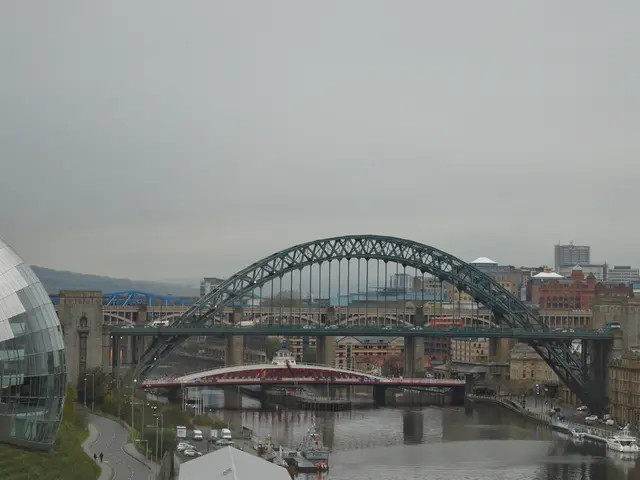A Toxic Tale: The Citarum River of Indonesia
Navigating a Sea of Debris En Route to the World's "Dirtiest River"
Bandung (dpa) - Wida Widiarti, a local resident, has witnessed the transformation of the Citarum River from a vital lifeline into a symbol of extreme environmental pollution. Named one of the dirtiest rivers in the world, the Citarum has lost its shine in Bandung, famous for its scenic mountains, green rice fields, and volcanoes.
"The trash might as well be part of the landscape," Widiarti says, standing near her daughter on the riverbank. The murky water is filled with plastic bottles, broken flip-flops, and unrecognizable debris, especially in some months when it's impossible to see the water due to the trash. "And even in better times, the river is never free of trash," she laments.
The Astonishing Waste Problem in Southeast Asia
Indonesia ranks as the second-largest polluter of the world's oceans with plastic waste, only behind China. The region, including many other countries, struggles with an enormous waste problem. Causes range from rapid population growth and mass tourism to inadequate waste separation, the lack of recycling infrastructure, and indiscriminate waste disposal, often due to a lack of environmental awareness.
"There's no 'away,'" environmental activist Annie Leonard points out. "When we throw something away, it must go somewhere."
Europe's Trash Journey to Asia
As for "somewhere," waste from Europe, especially from Germany, increasingly ends up in Asia. In 2024, Germany exported 732,000 tons of plastic waste - predominantly to Malaysia, Indonesia, and Vietnam. The tracking and control systems in the destination countries are often inadequate, making it difficult to ensure the waste gets properly recycled.
The Waste Crisis in Bali and Thailand
Even on tourist destinations like the popular island of Bali, neighboring Java, and Thailand, the beaches are far from paradise. During the rainy season, tons of waste wash up on the coasts, overpowering surfer's paradises like Kuta in Bali or popular islands like Koh Samui and Phuket in Thailand. Ocean currents transportation waste from other islands, while local sources also contribute significantly to the problem.
Textile Factories Poisoning the Citarum
The Citarum, a 290-kilometer-long river that provides drinking water, irrigation, and hydropower to nearly 30 million people, has been grappling with pollution since the region transformed into an industrial hub in the 1980s. Numerous textile factories, discharging untreated waste with heavy metals, dyes, and microplastics into the river, have exacerbated the problem.
Disturbed by the rampant pollution, the Indonesian government launched "Citarum Harum" (fragrant Citarum) in 2014, a cleanup campaign aimed at making the river's water drinkable again within seven years. After seven years, while the water quality has generally improved, many factories continue illegal nighttime wastewater discharge, emphasized environmental activists.
Breaking the Cycle of Plastic Pollution
The root causes of the Citarum's woes are more profound than just cleanup efforts. Regulating industries, educating the public, and transitioning to sustainable waste management are crucial to saving the Citarum and other waterways in Southeast Asia. Left unaddressed, these issues will perpetuate the vicious cycle of plastic pollution in the region.
- The Citarum River, once a vibrant lifeline, is now infamous for severe environmental pollution, a stark reflection of climate-change induced issues.
- Science has shown that the Citarum provides drinking water, irrigation, and hydropower to almost 30 million people in the region.
- Waste management in Southeast Asia, including nations like Indonesia, faces an overwhelming challenge, with causes such as population growth, mass tourism, and insufficient recycling infrastructure.
- In the fight against climate-change, the manufacturing and industry sector, particularly textile factories, contribute significantly to the Citarum's pollution, releasing untreated waste laden with heavy metals, dyes, and microplastics.
- Environmental activists advocate for business to integrate environmental-science and sustainable practices into their operations to reduce waste and combat the crisis.
- The financial implications of addressing the waste crisis are significant, but personal-finance management and strategic investment in sustainable technology are crucial for long-term returns.
- Renewable energy, an essential element of any sustainable lifestyle, can significantly reduce the reliance on fossil fuels and lessen the burden on the environment in both rural and urban settings.
- The food-and-drink industry, a significant contributor to waste, can adopt eco-friendly practices like zero-waste cooking and composting to minimize waste and promote a healthier lifestyle.
- In the realm of home-and-garden, sustainable practices like organic farming, rainwater harvesting, and energy-efficient appliances can contribute to a greener and cleaner environment.
- Education-and-self-development and career-development initiatives that emphasize environmental awareness and sustainability can empower individuals to make informed decisions for a more sustainable future.
- Technology plays a pivotal role in tackling the waste crisis, with data-and-cloud-computing solutions aiding in waste management, and sports-betting platforms promoting eco-friendly practices through sponsorship and partnerships in sports events like basketball.








